Part of HKFP’s Shifting Narratives series.
The upcoming District Council election will mark the final step in a drastic, Beijing-decreed overhaul of Hong Kong’s electoral system, with democrats largely excluded and “patriots” at the fore.

When polls are held on December 10 for the 18 local-level advisory bodies, the number of directly elected seats will be slashed from more than 450 to 88, with the rest appointed by the city’s leader, government-appointed committees and officials.
HKFP looks at how the official narrative about the councils has shifted – from conciliation to denunciation – since the pro-democracy camp took control of 17 councils on November 24, 2019, following months of protests.
‘The government respects the election results’
Then-chief executive Carrie Lam, in a statement the following day, said “the HKSAR Government respects the election results,” adding that the elections had been held “in a peaceful, safe and orderly manner.”
“There are various analyses and interpretations in the community in relation to the results, and quite a few are of the view that the results reflect people’s dissatisfaction with the current situation and the deep-seated problems in society,” Lam said in the statement.
“The HKSAR Government will listen to the opinions of members of the public humbly and seriously reflect.”
Lam, in a press briefing a day after her statement, acknowledged “a more political dimension” to the polls.
“We were aware of the large number of voters coming out to cast their vote, perhaps not only to select a preferred candidate to sit on the District Council, but also to express a view on many issues in society,” she said, listing “deficiencies in governance… unhappiness with the time taken to deal with the current unstable environment and to end violence,” as some such issues.
But such conciliatory comments were the last of their kind as relations between the new district councils and the government worsened, with officials walking out of meetings, and motions condemning the police force being raised.
Oath of allegiance sparks resignations
In June 2020 Beijing imposed a sweeping national security law outlawing subversion, secession, collusion with foreign forces, and terrorist activities. Late that year it passed a resolution to oust lawmakers who were seen to endanger national security.
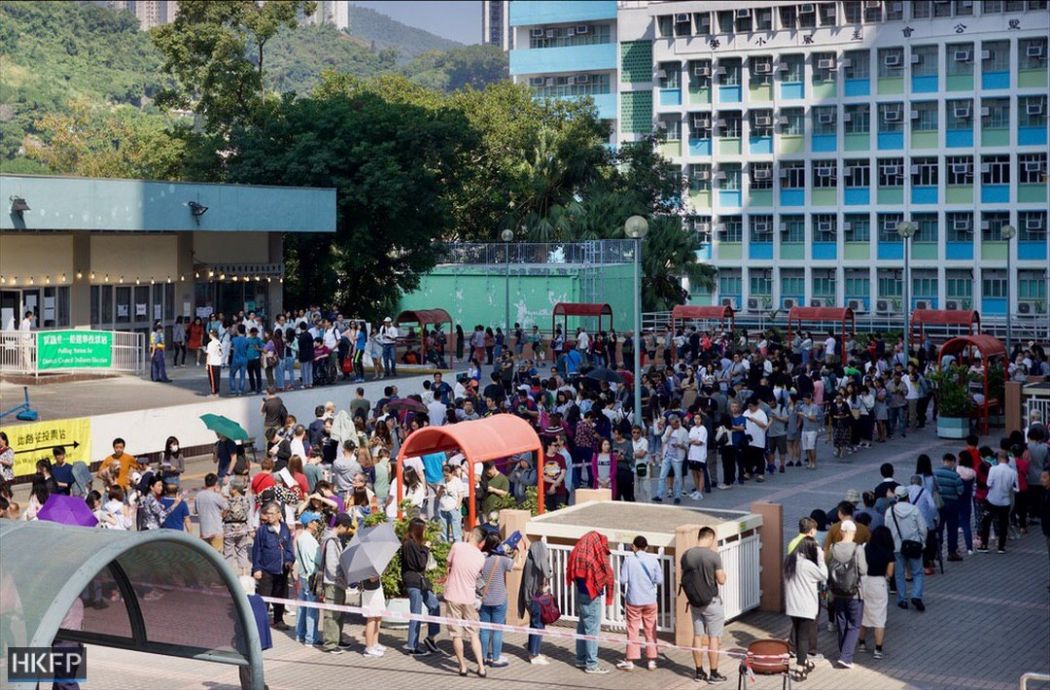
The resolution stated that lawmakers who promoted or supported Hong Kong independence and refused to admit China’s sovereignty over the city should be considered in breach of their oath of allegiance to the city.
Four pro-democracy legislative councillors, Alvin Yeung, Dennis Kwok, Kwok Ka-ki, and Kenneth Leung, were expelled from the Legislative Council (LegCo) following the resolution. Other democrats resigned en masse in protest.
But the new requirement did not stop at LegCo. The city witnessed an exodus of pro-democracy district councillors as LegCo in May 2021 passed a bill requiring district councillors to swear allegiance to the city and vow to uphold the Basic Law.
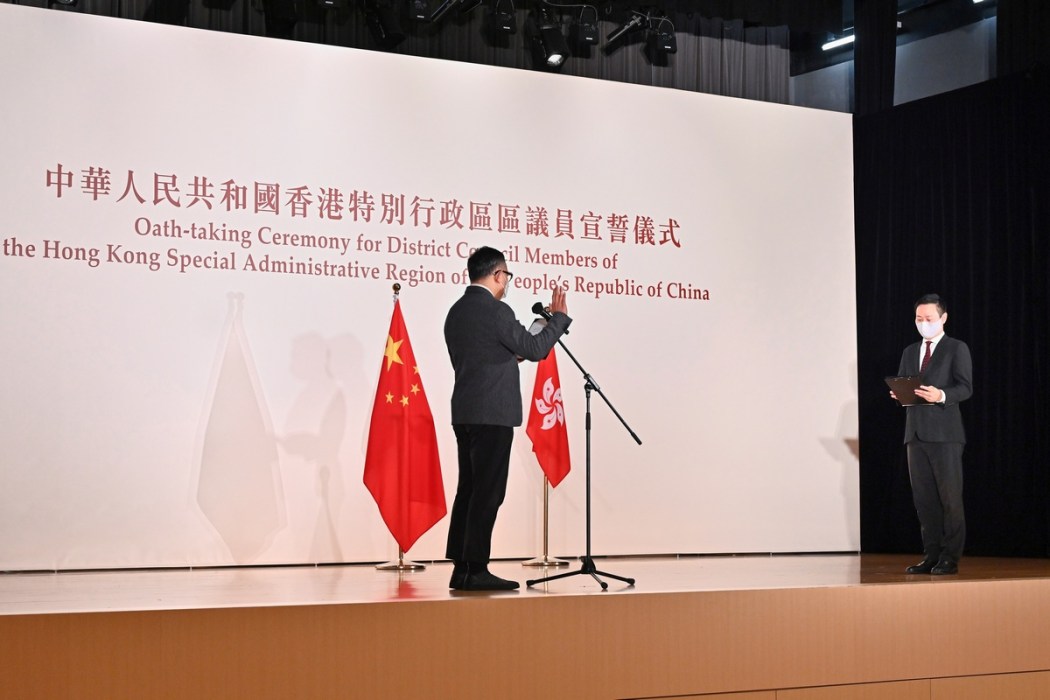
The resignations were prompted by local media reports, citing unspecified sources, that district councillors whose oaths were considered insincere would be forced to quit and repay all the salary and allowances they had received since 2020.
‘Patriots governing Hong Kong’
Hong Kong also saw the revival of the principle of “patriots governing Hong Kong” in the wake of the national security law.
In a briefing with Lam in early 2021, Chinese leader Xi Jinping said that in order to ensure the stable implementation of One Country, Two Systems, there must be “patriots governing Hong Kong.”
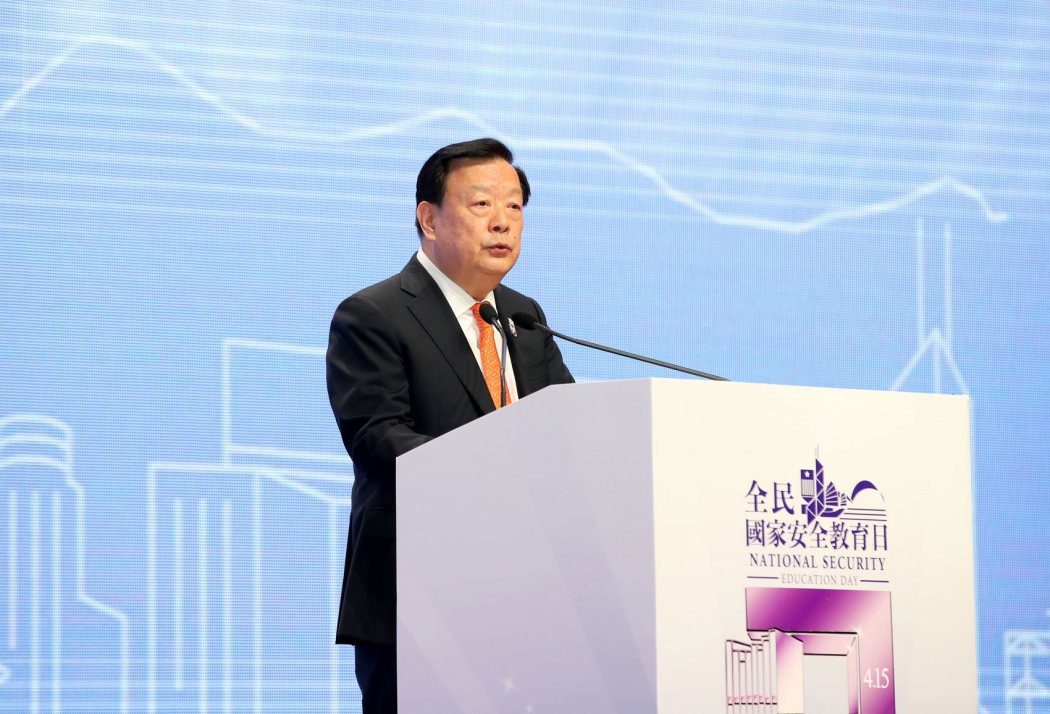
Xia Baolong, the then-director of China’s Hong Kong and Macau Affairs Office, told a seminar in February 2021 that “radical separatist forces” had entered bodies such as the Legislative Council and District Councils through elections.
“Especially under the influence of the ‘extradition bill storm,’ some ‘black riots,’ ‘mutual destruction’ and ‘Hong Kong independence’ elements entered the District Councils in the 2019 District Council election,” Xia said.
They had turned “a public organisation that was supposed to serve the community and the grassroots into a highly politicised battleground, making a terrible mess.”
Weeks later, China’s top legislature, the National People’s Congress, passed a resolution to overhaul the city’s electoral system.
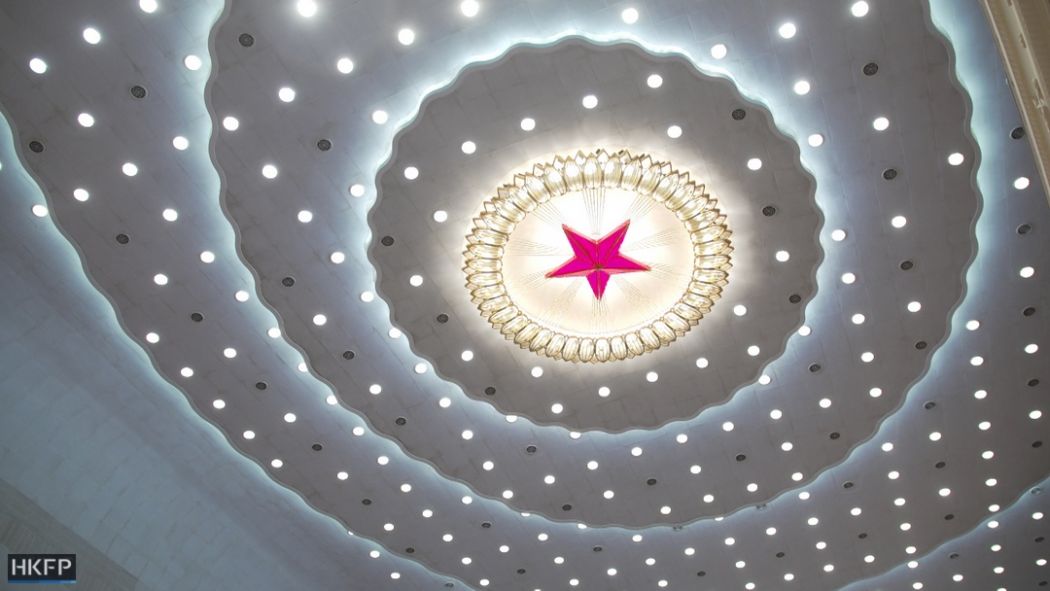
The then-chief executive said the “improvement” of the electoral system, the implementation of the “patriots ruling Hong Kong” principle, and the plugging of loopholes could help solve the city’s problems.
“Actually in recent years, it is obvious that some politicians with ulterior motives made use of loopholes, or what we call flaws, in the current system, to enter the political system,” Lam said.
“They entered the political system not to help the administration or citizens, but a lot of the times to be destructive, to oppose the Central government, and to hold the government back.”
In May 2021 the Legislative Council, devoid of democrats, passed a sweeping electoral overhaul which sharply reduced the proportion of directly elected lawmakers, tightened control over the polls, and introduced a complex system of candidate vetting.
After the election in December that year, which saw a record low turnout, only one self-proclaimed non-establishment lawmaker was elected to the “patriots-only” legislature.
Plugging ‘loopholes’ in the District Councils
It fell to Lam’s successor, ex-policeman John Lee, to extend the overhaul to the District Council elections.
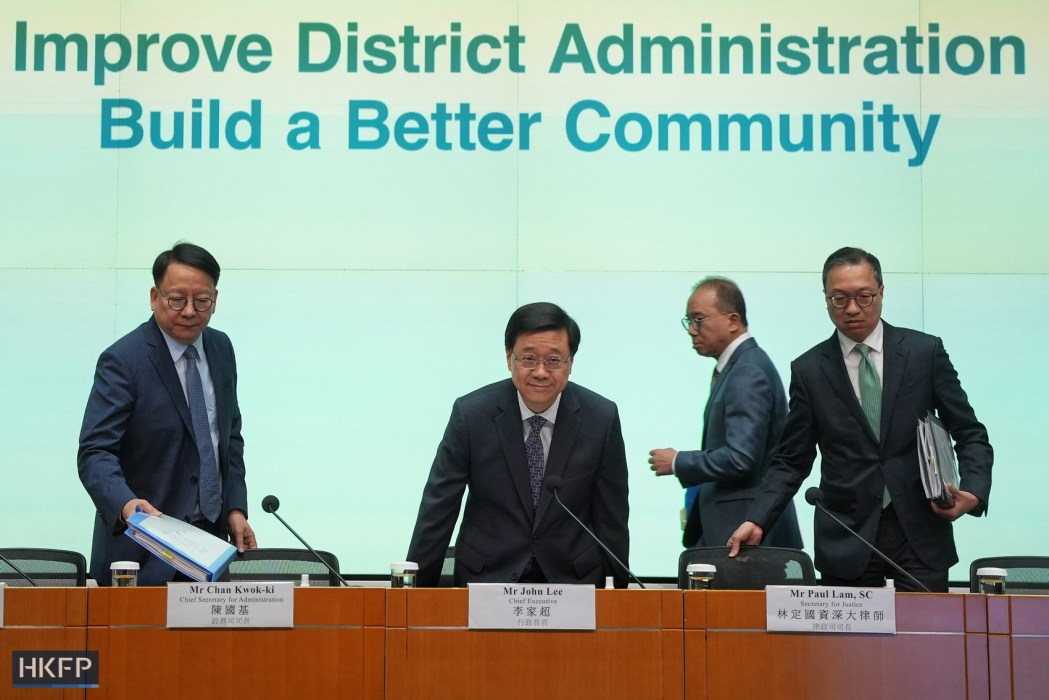
Lee continued the “plugging loopholes” narrative, and insisted that the government must stop the advisory councils from operating as a platform for supporters of unrest.
“We must plug all the loopholes in the system to prevent the District Councils from again becoming a platform for [advocating] black riots, Hong Kong independence and mutual destruction,” he said in May.
“We must prevent those who opposed China and stirred up chaos in Hong Kong from hijacking, manipulating, paralysing the District Councils.”
Apart from the perceived need to plug loopholes, the government went further and alleged that anti-China elements had “usurped” control of the District Councils.
Secretary for Constitutional and Mainland Affairs Erick Tsang, during the second reading of the District Council overhaul bill, said those elements had “swindled” a large number of votes in the 2019 election.
“At the peak of the ‘black riot,’ anti-China elements stirring up trouble in Hong Kong continued to create political issues, and even spread rumours, released false information, instigated crowd sentiments and opposition and hate towards the government, and swindled a large amount of votes and seats through the imperfect District Council electoral system and using many kinds of despicable tricks,” said Tsang.
Members of the “patriots-only” legislature echoed the new narrative.
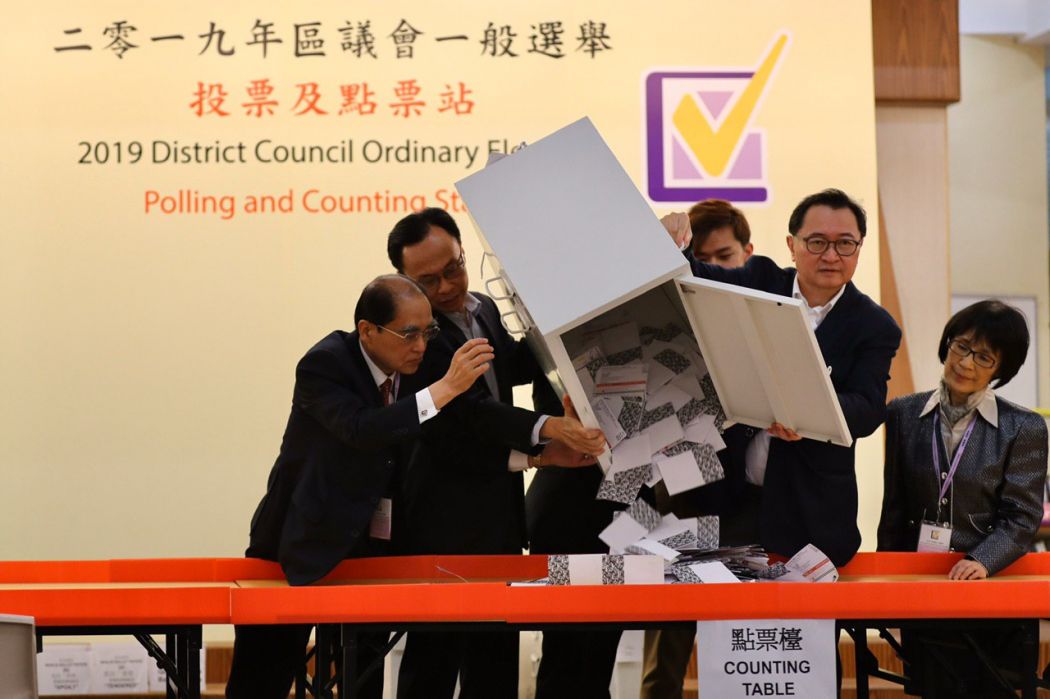
Pro-Beijing lawmaker Junius Ho, who lost his Tuen Mun District Council seat four years ago, called the 2019 election a “coup” during the second reading.
In a Facebook post in 2019 following his defeat, Ho had said the election was “extraordinary” and the results were “abnormal.”
“The world turned upside down. With great regret, I lost this District Council election, and only received 2,613 votes. Although I received five to six hundred more votes compared to the last election, I still was almost 1,200 votes behind my opposition,” said the lawmaker in 2019.
“This year is unusual, the election was unusual, and the results were abnormal!”
However, in 2023, the lawmaker criticised the government for not having had the foresight to stop those elections.
“Thinking back to 2019, there was a coup… the government then did not have the foresight, and allowed the District Council election to go ahead under such upheaval,” Ho said last month.
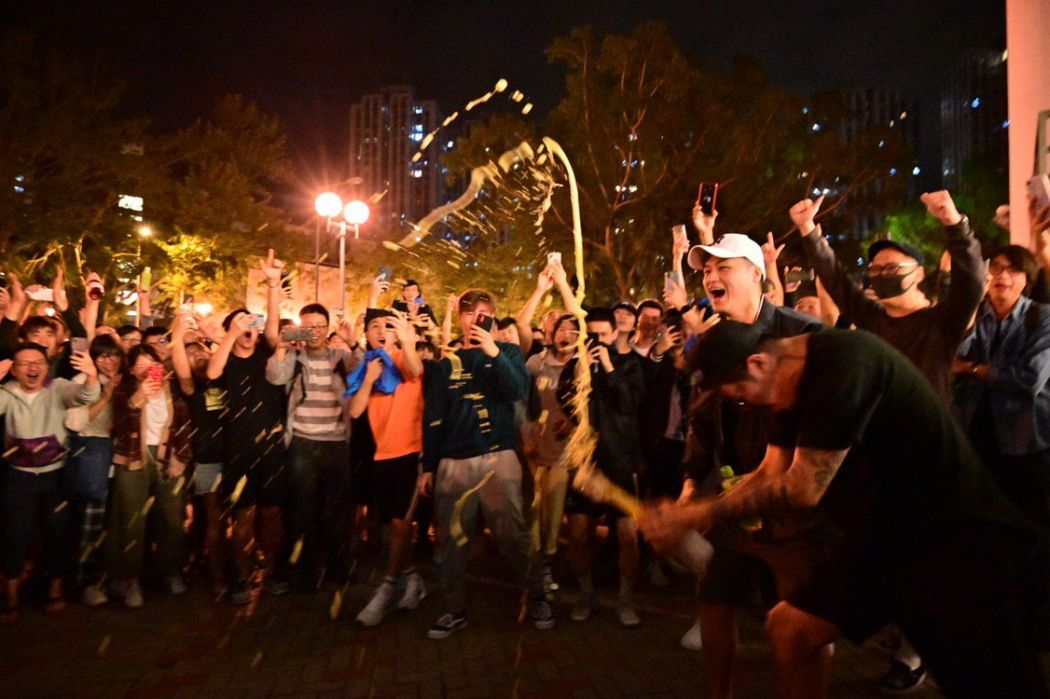
The pro-establishment New People’s Party complained back in December 2019 that the contest had been unfair because almost a dozen of its offices had been vandalised.
Its leader, Regina Ip, told LegCo last month the district-level administration introduced by the British colonial government in the 1980s, had been a “Trojan horse.” It ended up making the District Councils more politicised, with some even trying to use the bodies to seize power, she said.
Ip said the “radicalised” councils had put up “major resistance” to measures intended to improve people’s lives.
‘Tough and painful’ for remaining democrats
With less than four months until the December election, the remaining members of the beleaguered pro-democracy camp are agonising over whether to throw their hats in the ring.
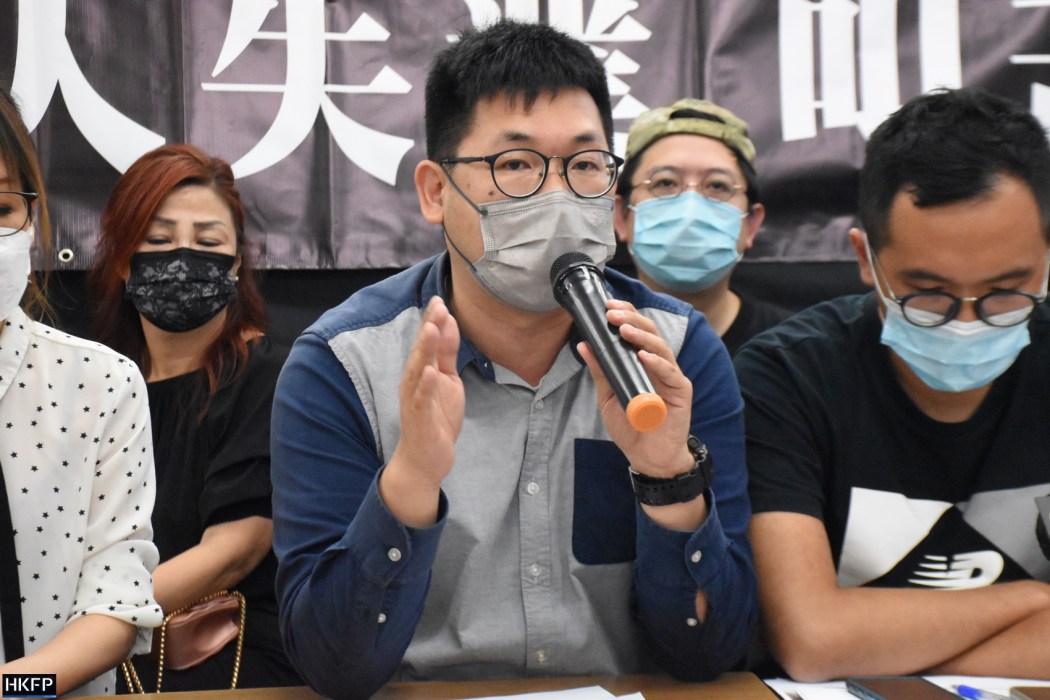
Mok Kin-shing, vice chairperson of the largest pro-democracy group the Democratic Party, has said it was a “tough and painful” decision.
Even if Democratic Party candidates were able to pass the vetting process and win seats, they would be subject to government monitoring and a probe if their performance was deemed unsatisfactory – risking salary cuts, suspension or even disqualification, he said.
“The Democratic Party, which has gone through 29 summers and winters since its establishment, has always been community-oriented. However, under the new circumstances, whether the Democratic Party ultimately decides to run for election or not is a tough and painful decision,” read his op-ed in Ming Pao.
Support HKFP | Policies & Ethics | Error/typo? | Contact Us | Newsletter | Transparency & Annual Report | Apps
Help safeguard press freedom & keep HKFP free for all readers by supporting our team

























